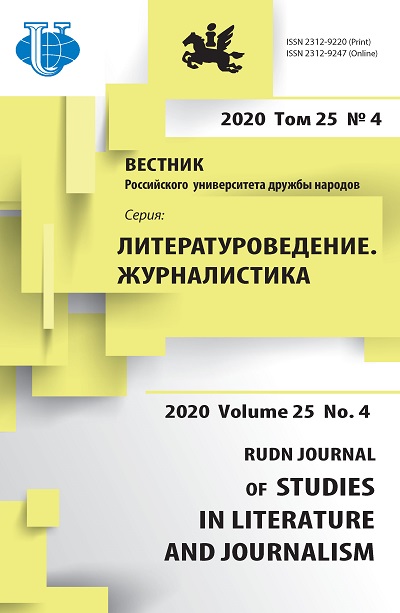Медиарепрезентация политических лидеров: исследовательские подходы
- Авторы: Линь Ч.1, Смирнова О.В.1
-
Учреждения:
- Московский государственный университет имени М. В. Ломоносова
- Выпуск: Том 25, № 4 (2020)
- Страницы: 766-774
- Раздел: Журналистика
- URL: https://journals.rudn.ru/literary-criticism/article/view/25461
- DOI: https://doi.org/10.22363/2312-9220-2020-25-4-766-774
- ID: 25461
Цитировать
Полный текст
Аннотация
Медиарепрезентация деятельности политических лидеров в СМИ в настоящее время недостаточно хорошо изучена в науке. В данной статье восполняется этот теоретический пробел через рассматривание существующих научные исследований и отраженных в них подходах к репрезентации политиков. Ее цель - показать, какие подходы к репрезентации деятельности политических лидеров существуют в современной теории медиарепрезентации. Для этого анализируются основные исследовательские подходы к медиарепрезентации политических лидеров. Поскольку журналистика создает политический дискурс отчасти спонтанно, а отчасти продуманно, существует множество подходов к репрезентации деятельности политических лидеров в медиа. Учитывая, что часть контента о политических лидерах создается стихийно, исследовательские подходы, описывающие более продуманный подход к генерированию политического контента в СМИ, особенно интересны в рамках данного исследования. В российских научных исследованиях не встречаются классификации исследовательских подходов к репрезентации деятельности политических лидеров, соответственно, данное исследование обладает новизной. Более того, исследование является одним из первых на тему медиарепрезентации деятельности политических лидеров. Этот процесс и его результаты мало освещены в российской науке. В статье используются методы классификации и сравнительного анализа. Предлагается классификация подходов, которые используются в различных науках, описывается специфика медиарепрезентации. В основе классификации лежит идея о том, что медиарепрезентация - это важный общественный процесс, который осмысляется не только в теории журналистики. Сравнительный анализ осуществляется при сравнении теорий медиарепрезентации. Делается вывод, что такой подход, как моделирование, наиболее интересен с практической точки зрения: моделирование способствует увеличению ответственности журналистов и более осознанному подходу к репрезентации политической жизни общества. Моделирование репрезентации деятельности политических лидеров предполагает, что создание контента о политических лидерах станет менее стихийным, более упорядоченным. Оно может помочь создать ориентир для более адекватной репрезентации деятельности политических лидеров.
Об авторах
Чуаньчжао Линь
Московский государственный университет имени М. В. Ломоносова
Автор, ответственный за переписку.
Email: linchuanzhao@mail.ru
аспирантка кафедры периодической печати факультета журналистики
Российская Федерация, 125009, Москва, ул. Моховая, д. 9Ольга Владимировна Смирнова
Московский государственный университет имени М. В. Ломоносова
Email: smirnova.olga@smi.msu.ru
кандидат филологических наук, доцент, заведующая кафедрой периодической печати факультета журналистики
Российская Федерация, 125009, Москва, ул. Моховая, д. 9Список литературы
- Коданина А.Л. Политика и журналистика как родственные коммуникационные сферы // Вестник Нижегородского университета имени Н.И. Лобачевского. 2014. № 2 (2). С. 444-447.
- Акопова Д.Р. Стратегии и тактики политического дискурса // Вестник Нижегородского университета имени Н.И. Лобачевского. 2013. № 6. С. 403-409.
- Берендеев М.В. Образ и дискурс: к вопросу о дискурсивном характере формирования политических образов // Вестник Балтийского федерального университета имени И. Канта. Серия: Гуманитарные и общественные науки. 2011. № 6. С. 91-99.
- Есимбетова С.К. Дискурс, политический дискурс в языкознании // Актуальные научные исследования в современном мире. 2017. Т. 32. № 12-2. С. 21-25.
- Chilton P. Analysing Political Discourse: Theory and Practice. London, New York: Routledge, 2004. 240 p.
- Галинская Т.Н. Корпусный подход в реконструкции медиаобраза языковой личности политика // Известия высших учебных заведений. Поволжский регион. Гуманитарные науки. 2014. № 2 (30). С. 114-124.
- Зелянская Н.Л. Медиаобраз политика: интернет-сообщество как агент политической реальности // Политическая лингвистика. 2014. № 4. С. 120-126.
- Новикова Е.Н. Технологии и механизмы формирования имиджа политического лидера // Известия высших учебных заведений. Поволжский регион. Общественные науки. 2009. № 2. C. 19-25.
- Петренко Д.В. Воспроизводство и повторение: медиаобраз между эстетической идентификацией и режимами власти // Гилея: научный вестник. 2016. № 114 (11). С. 225-228.
- Толкалов А.С. Сущность политического имиджа: отечественный и зарубежный опыт теоретического осмысления // Известия Саратовского университета. Новая серия. Серия Социология. Политология. 2013. Т. 13. № 2. С. 72-75.
- Линь Ч. Роль журналистики в репрезентации политической сферы жизни // Мир науки, культуры, образования. 2020. № 3 (82). С. 443-445.
- Ним Е.Г. Социологический анализ медиареальности: пространственный подход // Современные исследования социальных проблем. 2011. № 4. С. 105.
- Бурдье П. Социология политики. М.: Socio-Logos, 1993. 336 c.
- Шейгал Е.И. Семиотика политического дискурса. М.: Гнозис, 2004. 328 с.
- Елисеева М.А. Медиапространство: социально-философский анализ // Известия Саратовского университета. Новая серия. Серия Философия. Психология. Педагогика. 2019. Т. 19. № 1. C. 4-7. doi: 10.18500/1819-7671-2019-19-1-4-7.
- Маклюэн Г.М. Понимание медиа: внешние расширения человека. М. - Жуковский: КАНОН-Пресс-Ц, Кучково поле, 2003. 464 c.
- Лазутина Г.В., Линь Ч., Смирнова О.В. Моделирование как метод познания в контексте медиарепрезентации деятельности политической деятельности // Вопросы теории и практики журналистики. 2019. Т. 8. № 3. С. 569-584. DOI: 10.17150/ 2308-6203.2019.8(3).569-584.
- Кожемякин Е.А., Степаниденко М.С. Политика визуализации и визуализация политиков: медиарепрезентации кандидатов на пост президента РФ в 2018 году // Дискурс-Пи. 2019. № 3 (36). C. 78-97.
- Соловьев В.А., Морева А.Н. Медиатизация как фактор политического воздействия на массовую аудиторию // Вестник Московского государственного лингвистического университета. Общественные науки. 2018. № 1 (794). С. 89-102.
Дополнительные файлы















